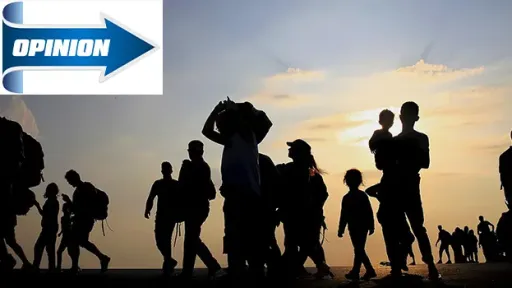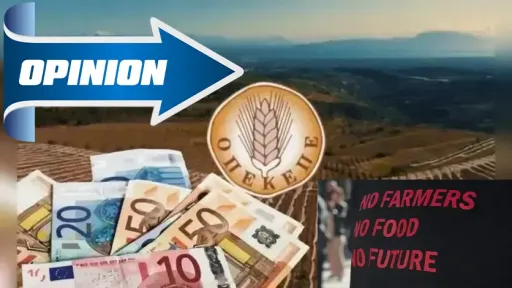Beyond borders: Global migration crisis

The complexity of international relations and law in the 21st century presents a dilemma in migration governance. While many continents are dealing with the issue of refugee and migration crisis, there are certain regions where the refugee crisis hits harder. These regions are usually followed by massive casualties, where migrants die in dire circumstances. This endeavour positions migration governance in a global spotlight as a phenomenon yet to be fully grasped by multilateral and intergovernmental organizations such as the United Nations High Commissioner for Refugees (UNHCR) and the International Organization for Migration (IOM).
The dynamic and complexity in attempting to address the crisis in migration governance is shadowed by a different political and socio-economic tapestry. This includes the reasons for migration, such as climate change, work opportunities, escaping conflict, or seeking political asylum, as well as geopolitical dynamics. Whereas migration is an inevitable occurrence since time immemorial, with massive deaths such as the recent Ethiopian boat capsize in Yemen jeopardizing humanitarianism in migration governance today.
Unlike what many believe, much of Africa’s migration happens outside the continent – intra-continental migration within Africa is more common than migration to Europe. The Mo Ibrahim Foundation in 2020 debunked this misconception of Africa overwhelming Europe, finding that only 7.2% of African migrants were in European Union (EU) countries. Therefore, the media’s narrative, such as “the boat migration” to Europe, contradicts data that points to a decline in European migration. Nevertheless, migration within and out of Africa occurs and the IOM maps out four main migration routes (Eastern, Southern, Northern and Horn of Africa) in East and the Horn of Africa (HoA).
The Eastern route, also known as the “Yemeni Route,” is regarded as the riskiest and the busiest, dominated by Ethiopian migrants. The boat capsizing in Yemen in August 2025, killing 76 migrants, proves how deadly this pathway is. The journey spans Bosaso in Puntland, Somalia and Obock in Djibouti, across the Gulf of Aden to Yemen, with the Kingdom of Saudi Arabia often regarded as the destination. Human Rights Watch in 2023 reported that other risks in this pathway included encounters with the Houthis, who are notorious for mass killings, close-range shootings and explosive weapon attacks. Moreover, in an attempt to reach the Saada camp in Saudi Arabia, migrants experience physical abuse, smuggling, human trafficking, extortion and bribery.
Continually, Europe and Africa are at the forefront, grappling with refugee and migration issues. Amid the struggle, the lens of the migration governance dilemma is being grappled with by many Western countries, such as the U.K. and the U.S. This has prompted both the U.S. and the U.K. to take advantage of and see it as an opportunity to offload illegal migrants to some African countries.
Despite the existence of a "Third country" enshrined in the international humanitarian law (IHL), the urge to entice some African countries with compensation to serve in this capacity, with insufficient necessary infrastructure, portrays Africa as a "dumping site" for illegal migrants. For instance, despite Rwanda's willingness to be a "third-party" state in the U.K.-Rwanda refugee deal, dubbed the Rwanda-U.K. Migration and Economic Development Partnership (MEDP), in 2022, the U.K. Supreme Court deemed it unfit, as it contravened the 1951 Geneva Convention and the principle of non-refoulement in international law. Furthermore, this action demonstrated a shift of the country’s international responsibility, contradicting the principle of territorial asylum under IHL.
Also, the U.S. has recently strived to deport most of its undocumented immigrants; approximately 250 are bound to be deported to Rwanda in a deal made under U.S. President Donald Trump’s administration in August 2025. This effort follows a long-term attempt to do so in other African countries, such as South Sudan and Libya.
Migration crisis in Europe, the Middle East
The European migration crisis appears to be experiencing a surge, unfolding like an avalanche in the 21st century. The 2023 statistics point out that EU countries have received 4.3 million migrants and asylum-seekers, led by Germany, Spain, France and Italy consecutively. Since the onset of the Ukraine-Russia war in 2022, the intracontinental migration has spiked within Europe. While the EU confronts a migration crisis as a bloc with its member states, the complexity of dealing with the issue as a member state has resulted in members enforcing force majeure in certain circumstances.
On the other hand, the Middle East region, with the ongoing Israel-Palestine conflict in Gaza, remains destabilized and further escalation of tensions between countries could create a spike in migration. Historically, migration in the region has occurred in tandem with the different regional conflicts. The height of this was felt during the Arab Spring in 2011, which saw the displacement of 14 million Syrians. Türkiye, through its open-door policy at that time, welcomed approximately 3 million Syrian refugees, playing a vital role in their resettlement. While some refugees settled in Türkiye, others saw it as a gateway to Europe through Greece. While the European Border and Coast Guard Agency (Frontex) attempted to manage the situation at the Greece-Türkiye border in collaboration with local police, humanitarian calamities occurred from time to time. An example happened in April 2025 when two boats capsized near the Greek island of Lesbos, killing 16 migrants.
In a nutshell, migration governance aims to establish the necessary infrastructure for the resettlement of migrants in any country. However, this must be balanced with international law across all nations. This places humanitarianism on a pedestal, urging countries to fulfill their international obligations under various refugee conventions while also considering their own national interests on migration issues. A balance would be ideal, but the case of migration presents complexities such as integration, voluntary repatriation and the existence of "third-party" countries, lest humanity lose its grip and reduce its response to mere lip service in an attempt to address migration with imbalanced interests at heart. We must remember that being a refugee is a badge of strength, courage and survival, not an identity or social status that anyone aspires to. Thus, the mind echoes with humanitarianism in the words of Warsan Shire, who reminds us in her poem Home that “No one puts their children in a boat unless the water is safer than the land.”
by Emmanuel Mamadi-DailySabah







